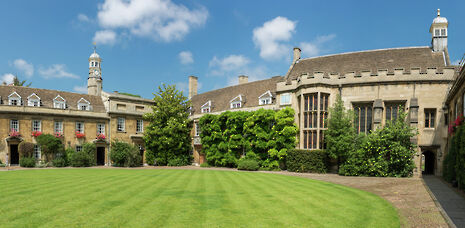Christ’s offers apology for ‘significant failings’ in investigation of anti-Semitic abuse
The college admitted that the initial investigation, which concluded that no anti-Semitic or racial abuse had taken place, had been wrong

In a statement released yesterday, Christ’s College apologised for their handling of a complaint of anti-Semitic abuse.
In October, two students lodged a complaint with Christ’s College after allegedly receiving racist and anti-Semitic threats at an event organised by two of the college’s sporting societies.
The statement acknowledged “significant deficiencies” in the way the complaint was handled, stating that the complainants had been “extremely disappointed” by the college’s response, and “felt their report had not been taken as seriously as might other reports of racial abuse”.
After the incident, two Christ’s students were “disciplined for swearing and physical aggression”’, and the societies in question were banned from organising social events outside of the college for the remainder of the academic year. However, the college dismissed allegations of anti-Semitism and racist abuse.
In the statement, the college admitted that these findings had been erroneous, and after “having considered all the available material,” it had come to the conclusion that “anti-Semitic abuse had indeed occurred and that a group of Christ’s students, albeit unidentified, were responsible for that abuse.”
After a letter was written to the college by several Jewish organisations, including the Jewish Leadership Council (JLC), expressing their concerns about the case, an independent review was carried out by external legal experts into how the complaint was handled.
The report found that “thought there was no bad faith or intention to cover up, there were significant failings in the way the college responded to the complaint”, including a failure to identify a wrongdoer or even establish conclusively that the abuse had taken place. These deficiencies, according to the report, resulted in “considerable hurt and dismay” in the Jewish community.
The statement concluded: “Christ’s is a thriving, diverse and tolerant community. Though this disgraceful incident of racist and anti-Semitic abuse was an isolated one, it should never have happened and is abhorrent to the core values of the College.”
Following recommendations made in the report, Christ’s College have taken action to reform their complaint and disciplinary procedures. They have also extended the ban on the college societies implicated in the incident holding external social events to October 2019, unless the individuals who committed the abuse come forward.
The incident at Christ’s follows a number of other incidences of anti-Semitism in Cambridge. In February of this year, anti-Semitic flyers were left on the Sidgwick site, and swastikas were found drawn on a map on Jesus Green.
In Thursday’s statement, Professor Jane Stapleton, Master of Christ’s College, offered her apologies for the way in the college initially responded to the complaint: “We greatly regret the deficiencies in the way the complaints were originally handled and have taken further measures against the two student societies involved. The Jewish community can be reassured that if there were to be a similar incident in the future the College would address it robustly”.
Speaking to Varsity, Shlomo Roiter-Jesner, one of the students who lodged the complaint with Christ’s College, welcomed the statement, saying it was “the best result we could have achieved, given the institutional constraints”.
When asked if he believed anti-Semitism to be a systemic problem at the University, he disagreed, but added, “It is something people need to be aware of, even if they do not see it on a daily basis”.
Roiter-Jesner also emphasised his gratitude towards Professor Stapleton, who had been “most responsible for helping us reach an amicable solution”.
In a statement, a University spokesperson highlighted the Code of Conduct, established in October 2016, which “explicitly specifies a number of types of behaviour which the University considers unacceptable,” but declined to give further comment on the case.
 News / Caius mourns its tree-mendous loss23 December 2025
News / Caius mourns its tree-mendous loss23 December 2025 News / Clare Hall spent over £500k opposing busway 24 December 2025
News / Clare Hall spent over £500k opposing busway 24 December 2025 Comment / Yes, I’m brown – but I have more important things to say22 December 2025
Comment / Yes, I’m brown – but I have more important things to say22 December 2025 Comment / The ‘class’ of Cambridge24 December 2025
Comment / The ‘class’ of Cambridge24 December 2025 Interviews / Politics, your own way: Tilly Middlehurst on speaking out21 December 2025
Interviews / Politics, your own way: Tilly Middlehurst on speaking out21 December 2025







